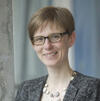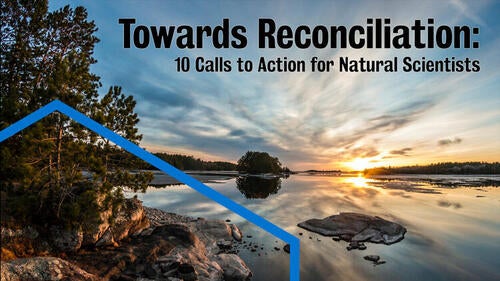 Contact
Contact
Carmen Wong, Kluane National Park and Reserve, Parks Canada, Whitehorse, Yukon Territories, Canada
Kate Ballegooyen, Kluane First Nation, Yukon Territories, Canada
Lawrence Ignace, Lac des Mille Lacs First Nation, Yukon Territories, Canada
Mary Jane (Gùdia) Johnson, Kluane First Nation, Yukon Territories, Canada
 Heidi Swanson, University of Waterloo, Biology
Heidi Swanson, University of Waterloo, Biology
Introduction
In 2015, the Truth and Reconciliation Commission released 94 Calls to Action to enable reconciliation between Indigenous and non-Indigenous Canadians. Lacking education on the history of Indigenous peoples and without personal connections to Indigenous communities, many Canadians fail to grasp the depth of systemic racism that prevails. To many, reconciliation remains an elusive concept.
Many Indigenous communities distrust researchers because of past exploitations, which include treatment of Indigenous peoples as research subjects without consent, misuse of data, theft of cultural resources, and manipulation of wildlife. The authors have all witnessed examples where scientists treat Indigenous communities with blatant disrespect or with profound ignorance of Indigenous rights without realizing how much research can benefit from an Indigenous perspective. Reconciliation within the research process is therefore required to rebuild trust and respect.
In this paper, the authors outline 10 Calls to Action to natural scientists to enable reconciliation. The Calls focus on natural scientists because of the strong connections between Indigenous peoples and the land. Natural scientists and Indigenous communities alike are interested in understanding patterns at the level of landscapes and, more recently, how landscapes are changing with human influences such as climate change. The authors also focus on natural sciences because of the underrepresentation of Indigenous peoples in natural science fields in all levels of formal education.

Calls to Action to natural scientists working in Canada
Call 1: We call on natural scientists to understand the socio-political landscape around their research sites.
Indigenous peoples have the right to self-determination and non-Indigenous Canadians have an obligation to understand how Indigenous peoples are, or attempting to, express these rights. Indigenous peoples also have the right to determine priorities and strategies for the use or development of their lands and individual researchers, especially those receiving public funds, should consider their obligation to consult and co-operate with Indigenous communities to obtain their consent.
Call 2: We call on natural scientists to recognize that generating knowledge about the land is a goal shared with Indigenous peoples and to seek meaningful relationships and possible collaboration for better outcomes for all involved.
Indigenous communities and scientists might find common ground by understanding that we are all part of something greater than our differences and that complex problems can benefit from multiple ways of knowing. Because Indigenous peoples have deep understanding of the land and continue to require new information, early engagement with Indigenous communities can determine shared research questions and explore where Indigenous and Western knowledge systems may complement each other.
Call 3: We call on natural scientists to enable knowledge sharing and knowledge co-production.
Reconciliation aims to restore balance in the relationship between Indigenous peoples and non-Indigenous Canadians and requires a shift in power and knowledge, including who holds knowledge and who decides what type of knowledge is recognized as valid. Natural scientists hold a vast amount of knowledge, however this typically only gets shared with Indigenous communities through inaccessible scientific journal articles, if shared at all. Meaningful knowledge co-production and sharing results in better understanding and management of resource activities on the land.
Call 4: We call on natural scientists studying animals to seek out advice from Elders for respectful ways of handling animals.
Research on animals in Canada requires demonstration of humane practices and approval from universities or governments. While Indigenous worldviews align humane practices, there is often much more required in specific, local customs to demonstrate respect to animals and the land. Seeking out information and advice on these protocols, in particular from Elders, will help natural scientists obtain the trust and social license for their research with Indigenous communities.
Call 5: We call upon natural scientists to provide meaningful opportunities for Indigenous community members, particularly youth, to experience and participate in science.
Encouraging and supporting future generations of Indigenous researchers is a commonly stated objective of Indigenous communities. The authors believe that natural scientists can provide unique opportunities to engage youth by bringing them out on their traditional territory while exposing them to technology and science. Skills, understanding, and capacity can be built from these field experiences, particularly if Indigenous youth are hired as field technicians.
Call 6: To decolonize the landscape, we call on natural scientists to incorporate Indigenous place names as permitted.
Using Indigenous place names recognizes the long history of Indigenous peoples’ relationship with the land. A map using Indigenous place names tells a story which is a stark contrast to a map using Western names that mostly mark one-time visits by early surveyors, mining recorders, or other non-local white men. By placing the Indigenous name first followed by the English name in maps and text associated with scientific research, users are recognizing the stories and the Indigenous Knowledge behind the names.
Call 7: We call upon natural scientists and their students to take a course on Indigenous history and rights.
The majority of research applications reviewed by the authors, from early-career to well-established scientists, demonstrate ignorance of the social–political landscape and why things in northern Canada might work differently than in the south. Requiring a mandatory course on Indigenous history and rights taught by Indigenous instructors for all undergraduate students would help address this. The authors also encourage natural scientists that teach to develop a deeper commitment to exposing students to Indigenous Knowledge and approaches to the land.
Call 8: We call on funding bodies to change approaches to funding.
Considerable progress has been made in the past several years with funding research that is led by or involves Indigenous peoples, but more action is required. Funding bodies are encouraged to prioritize research that directly responds to and involves Indigenous communities and to involve Indigenous reviewers in funding decisions.
Call 9: We call on editors of all scientific journals to recognize that publication of research on Indigenous Knowledge and cultural resources require review and permission from the respective Indigenous communities.
Publication in a scientific journal is often the conclusion of research. Unfortunately, Indigenous communities have no control on what gets published, regardless of conditions stipulated in research permits or data sharing agreements. Natural science journals should adopt guidelines on how to appropriately publish Indigenous Knowledge or information that follow the First Nations principles of ownership, control, access, and possession (commonly known as OCAP®) and those in the National Inuit Strategy on Research. In addition, the peer-review process for journals needs to be transformed to include a review from an Indigenous perspective when appropriate.
Call 10: We call on all natural scientists and postsecondary research institutions to develop a new vision for conducting natural science: fundamentally mainstreaming reconciliation in all aspects of the scientific endeavor, from formulation to completion.
Reconciliation requires a new vision for conducting natural science. Our experience with research permitting in a national park cooperatively managed with two First Nations, suggests a need for individual natural scientists to internalize this and find new ways for conducting science. A common question received about research permitting is whether consultation with Indigenous communities is required. True reconciliation requires going beyond what is required.
Conclusions
“For far too long, researchers have enjoyed great privilege as they have passed through our communities and homeland, using public or academic funding to answer their own questions about our environment, wildlife, and people. Many of these same researchers then ignore Inuit in creating the outcomes of their work for the advancement of their careers, their research institutions, or their governments. This type of exploitative relationship must end.” (National Inuit Strategy on Research; Inuit Tapiriit Kanatami 2018).
The authors argue that natural scientists must commit to reconciliation with Indigenous peoples, and that academic institutions recognize that there can be trade-offs between some of the standard metrics for excellence in the academy, and true progress with respect to reconciliation. The 10 Calls to Action challenge the scientific community to recognize that reconciliation requires a new way of conducting natural science, one that includes and respects Indigenous communities, rights, and knowledge. Better scientific and community outcomes will emerge from this paradigm shift.
One of the current risks is the debasement of the spirit of reconciliation as institutions and individuals rush to show they are making progress and resort to tokenism. The authors emphasize that institutions, funding agencies, and individual scientists need to resist the urge to colonize the process of reconciliation itself. Reconciliation will necessarily be long and deep. The authors hope our Calls to Action empower individual scientists to work with Indigenous communities to develop and enact a new social contract that includes the building blocks of reconciliation into the research process.
Wong, Carmen, Ballegooyen, Kate, Ignace, Lawrence, Johnson, Mary Jane (Gùdia) , Swanson, Heidi. Towards reconciliation: 10 Calls to Action to natural scientists working in Canada. FACETS, 1 October 2020. https://doi.org/10.1139/facets-2020-0005
For more information about WaterResearch, contact Julie Grant.






